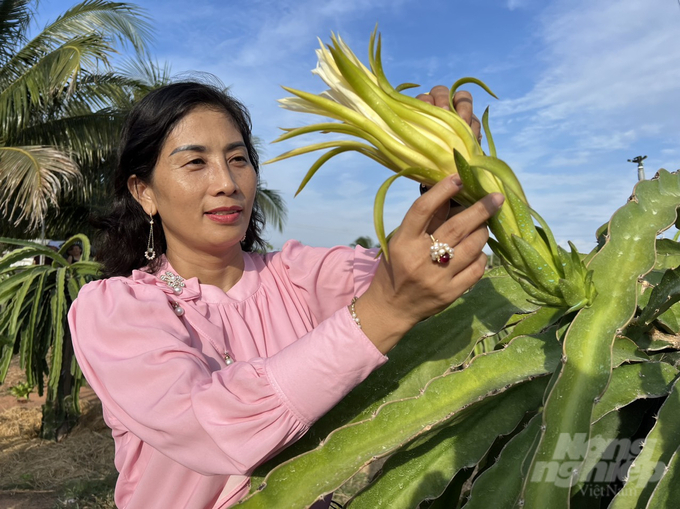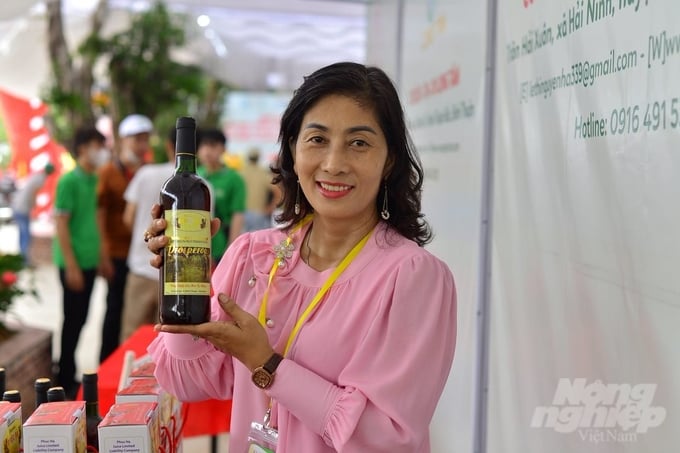November 24, 2025 | 01:10 GMT +7
November 24, 2025 | 01:10 GMT +7
Hotline: 0913.378.918
November 24, 2025 | 01:10 GMT +7
Hotline: 0913.378.918
Dragon fruit is a main force plant and the strength of Binh Thuan, with an area of 33 thousand hectares and an annual production of over 700 thousand tons. Product for consumption that consists primarily of fresh produce, but whose price and output are uncertain and largely dependent on the Chinese market. Therefore, research and product diversification is required to increase the value of dragon fruit.
In addition to canned fermented red dragon fruit juice, Phuc Ha Juice Co., Ltd (referred to as Phuc Ha Company, Hai Ninh commune), Bac Binh district, Binh Thuan province has researched and developed a variety of products from dragon fruit, including food coloring powder extracted from dragon fruit skin, concentrated dragon fruit juice, dragon fruit seed oil, and dragon fruit seed powder (product has been registered). The Korean market favors dragon fruit seed powder products, which are used as basic materials for cosmetic, pharmaceutical, and dietary food production.

The application of high technology, organic and GlobalGAP standards in production has helped dragon fruit trees to meet the requirements for deep processing. Photo: Minh Hau.
Ms. Le Thi Nguyen Ha, the director of Phuc Ha Company, explained that in order to maximize the value of dragon fruit, the company has researched and processed three-component products made from dragon fruit: skin, fruit flesh, and seeds. In particular, the skin of the dragon fruit is used to extricate the natural pigment, while the fruit pulp is separated from the liquid to obtain the seeds. Since then, the dragon fruit has been utilized to its maximum capacity, which has contributed to an increase in its value.
Ms. Ha added that in order to have quality products, ensure food safety and hygiene according to green-clean-safe criteria, and meet export standards, Phuc Ha Company has collaborated with VCCU Binh Thuan Agricultural Cooperative to construct a high-quality dragon fruit growing area in accordance with GlobalGAP standards. The use of advanced technology, an organic approach, and compliance with GlobalGAP standards in the production process aids in the growth and development of dragon fruit. After harvest, the fruit has a high yield, is delectable, and has a Brix level between 16 and 18 (sweetness), which is highly valued by consumers.
Binh Thuan is concentrating on constructing a model for the development of the OCOP product value chain in conjunction with local raw material areas, and developing small and medium-scale processing in the direction of the circular economy and organic agriculture. Consequently, Phuc Ha Company is one of the businesses designated to implement this orientation.
Phuc Ha Company has added machinery, equipment, cold storage, pre-processing facilities, and packing facilities to satisfy the export production capacity of large orders. In addition, the company intends to request ODA capital and access to small and medium enterprise support financing in order to construct a standard factory with an investment capital of approximately 40 billion VND. All goods are manufactured to export specifications.
Phuc Ha Company has successfully tested dragon fruit products and introduced them to foreign partners in Australia, South Korea, Europe, and the Middle East. These partners have inspected and praised the quality of the products, and have committed to investing in machinery and technology to increase productivity and product quality.

Prosperous fermented red dragon fruit juice product of Phuc Ha Company meets 4-star OCOP standard. Photo: Minh Hau.
Ms. Le Thi Nguyen Ha, the director of Phuc Ha Company, stated that the production process is carried out in accordance with the company's road map, as opposed to the traditional method, in which the product is released for immediate consumption but can also be dispatched. When successful, in-depth research and testing will register the technology before mass production, thereby preventing technology theft.
Currently, each month Phuc Ha Company produces approximately 30,000 liters of dragon fruit juice and over 2 tons of pigments, which are exported primarily to countries in the Middle East, South Korea, etc. Specifically, products containing dragon fruit seed powder are exported to these partners, who agree to cover the entire production output.
In the future, after concluding the factory between 2024 and 2025, Phuc Ha Company will produce high-quality OCOP products, conduct research, and manufacture additional dragon fruit-based products.
Translated by Linh Linh
/2025/11/21/4309-2-153400_128.jpg)
(VAN) Green and low-emission rice is paving the way for Vietnamese rice to enter high-end markets, marking the beginning of a transformation journey toward greening and elevating the national rice brand.

(VAN) ‘Right to Win’ outlines a national action plan that shapes a new vision for Viet Nam’s agriculture in an era of renewal and global integration.

(VAN) Lam Dong’s farmed sturgeon output this year is expected to reach 2,300 tons, worth VND 450 billion, affirming the brand’s position on the market.

(VAN) A surge in Ukrainian egg exports, largely driven by soaring sales to the UK over the last few years, has notably pushed up egg prices on the domestic market.

(VAN) The price of Arabica Catimor coffee in Quang Tri is currently at VND 25,000–27,000/kg (fresh cherries), the highest level ever recorded

(VAN) 'From the coffee story, we can think deeper and further about the crop production sector - from development orientations and value-chain organization to international integration,' assessed Dr Le Quoc Doanh.
/2025/11/18/2431-0-161627_248.jpg)
(VAN) Viet Nam accounts for 43% of the world's export volume of Robusta coffee. However, the Vietnamese Robusta coffee brand has yet to gain broad recognition on the global market.